Japan: Reform of Legislative Measures for Enhancing Human Rights Violations in Society
Universal Periodic Review 42nd Session
Review of Japan - Fourth Cycle
31st January 2023

By Khoa Doan / GICJ
Executive Summary
On the 31st of January 2023, the Universal Periodic Review (UPR) Working Group of the UN Human Rights Council conducted its fourth periodic review of the human rights situation in the Philippines. The country submitted its report on the 10th of October, 2022. Taking into account the recommendations made by Special Rapporteurs and treaty body experts, the Human Rights Council and civil society organisations delivered reports with a compilation of different human rights issues in Japan.
As part of the interactive dialogue, participating delegations raised several issues, which the Philippines addressed and clarified in its responses. Among the topics discussed werethe Right to Life, liberty, the security of persons, the Freedom from Torture, Human Rights and counter-terrorism, the Right to Privacy, prohibition of all forms of Slavery, including trafficking in persons, the Right to Work and to Just and Favourable Conditions of Work, the Right to Health, the Right to Education, Cultural Rights, development, the environment, and business and human rights, and the Rights of Specific Persons or Groups, including women, children, persons with disabilities, indigenous peoples and minorities, LGBTI persons, migrants, refugees and asylum-seekers, internally displaced persons, and stateless persons. Despite the country's progress in improving the human rights situation, Articles 11 and 97 of the Constitution undermine the protection of human rights and the long-standing discrimination against ethnic minorities, and indigenous people were excluded from the national human rights plan of the country.
Geneva International Centre for Justice (GICJ) calls for Japan to uphold the inviolability of fundamental human rights by deleting articles 11 and 97 of the Constitution. Furthermore, the GICJ urges the country to resolve and compensate for all comfort women caused by the Japanese military during the Second World War and end all discrimination against indigenous peoples and minorities.
Background
The Universal Periodic Review (UPR) is a UN mechanism established in 2006 (Res. 60/251) to examine the progress made by countries in compliance with their obligations under international law. UN member states are examined during each cycle, the current one being the fourth cycle. Japan was first reviewed in May 2008, then in October 2012, and finally in November 2017.
Japan submitted its country report for the fourth cycle of the UPR in October 2022, in accordance with paragraph 5 of the annex to Human Rights Council resolution 16/21. They emphasised that Japan accepted 145 recommendations (out of 217 recommendations under 52 themes). These recommendations related to the prevention of any forms of discrimination and elimination of any discriminatory provisions, the Rights of Specific Persons and Groups, assistance to minorities, measures against discrimination against foreigners, and others (business and human rights, labour and work environment),
Taking into account the recommendations made by Special Rapporteurs and treaty bodies experts, the Human Rights Council and civil society organisations delivered reports with a compilation of different human rights issues in Japan. Concerns were raised about the country’s cooperation with international human rights mechanisms and bodies, the national human rights framework, as well as the principles of equality and non-discrimination, the Right to Life, liberty and security of persons, and freedom from torture, human rights and counter-terrorism, administration of justice, including impunity, and the rule of law, fundamental freedoms and the Right to Participate in Public and Political Life, the Right to Privacy, prohibition of all forms of slavery, including trafficking in persons, the Right to Work and to Just and Favourable Conditions of Work, the Right to an Adequate Standard of Living, the Right to Health, the Right to Education, Cultural Rights, development, the environment, and business and human rights. Further, attention was given to the rights of vulnerable groups, such as children, women, persons with disabilities, indigenous peoples and minorities, LGBTI persons, migrants, refugees, and asylum seekers, internally displaced persons, and stateless persons.
Discussion with UN experts
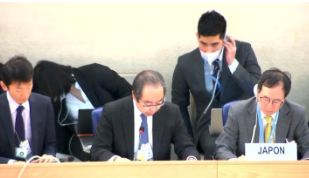 During this interactive dialogue, the floor was given to the Deputy Assistant Minister of the Ministry of Foreign Affairs, Mr. Imafuku Takao. Mr. Takao thanked the UN and the troika for their efforts. He affirmed that Japan had been consolidating a democratic political system and promoting policies to defend and promote human rights and fundamental freedom as universal values.
During this interactive dialogue, the floor was given to the Deputy Assistant Minister of the Ministry of Foreign Affairs, Mr. Imafuku Takao. Mr. Takao thanked the UN and the troika for their efforts. He affirmed that Japan had been consolidating a democratic political system and promoting policies to defend and promote human rights and fundamental freedom as universal values.
The floor was then given to Ambassador Extraordinary and Plenipotentiary and Permanent Representative of Japan to UNOG, H.E. Mr. Yamazaki Kazuyuki who emphasised that Japan has served as a member of the Human Rights Council for five terms and will continue to actively contribute to its activities, including the UPR. Japan took the lead at the G20 Osaka Summit in the areas of quality infrastructure investment, disaster prevention, marine plastic litter control, climate change, gender, health and education as the basis for “quality growth,” among other initiatives. Japan’s assistance to developing countries through Official Development Assistance (ODA) plays an important role in achieving SDG 3 in the international community. To promote women’s empowerment at home and abroad, the country has held the World Assembly for Women, or WAW!, five times since 2014, inviting leading figures in the political, economic and social fields for comprehensive discussions on various issues and actions to be taken toward achieving gender equality.
Since 2016, the country, under the SDGs Promotion Headquarters headed by the Prime Minister and comprising all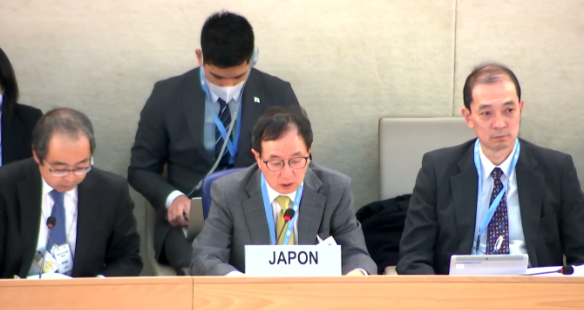 ministers, has formulated the SDGs Implementation Guidelines as a medium- to long-term strategy to achieve the SDGs and has been promoting the SDGs in Japan and abroad based on these guidelines. In September 2021, Prime Minister Suga participated via video message in the SDG Moment 2021 held in conjunction with the UN High Level Week. At that time, he spoke about how valuable Japan had found initiatives such as the process of formulating the VNR, the exchange of views with the private sector members of the SDGs Promotion Roundtable and civil society, and the public comments.
ministers, has formulated the SDGs Implementation Guidelines as a medium- to long-term strategy to achieve the SDGs and has been promoting the SDGs in Japan and abroad based on these guidelines. In September 2021, Prime Minister Suga participated via video message in the SDG Moment 2021 held in conjunction with the UN High Level Week. At that time, he spoke about how valuable Japan had found initiatives such as the process of formulating the VNR, the exchange of views with the private sector members of the SDGs Promotion Roundtable and civil society, and the public comments.
Finally, Mr. Kazuyuki highlighted that Japan shall bring all relevant ministries and agencies together in a whole-of-government effort in cooperation with stakeholders in various fields to lead the international community’s efforts to achieve the SDGs. The country guarantees the rights of specific persons and groups, prevention of any forms of discrimination and elimination of any discriminatory provisions, and prohibition of human trafficking via legislative measures.
In the ensuing debate, delegations took the floor highlighting several human rights issues.
Right to Health
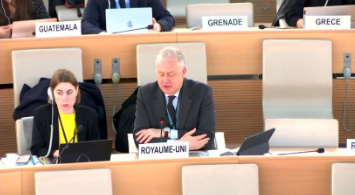 While the measures that followed the 2001 and 2019 court decisions in favour of persons affected by Hansen’s disease and their family members were positive and highly comprehensive, some gaps in the reparation programmes were identified. The UK recommended connecting restorative justice to prevention; guaranteeing the non-recurrence of gross human rights violations; expanding the scope of reparation programmes in order to ensure effective healing; and responding to the current and varied needs of persons affected by Hansen’s disease, taking a human rights-based approach. Japan also ignored the recommendation made during the previous universal periodic review cycle regarding the Fukushima Daiichi nuclear accident. The Netherlands called Japan to elaborate on the women’s health issues affected by radiation contamination.
While the measures that followed the 2001 and 2019 court decisions in favour of persons affected by Hansen’s disease and their family members were positive and highly comprehensive, some gaps in the reparation programmes were identified. The UK recommended connecting restorative justice to prevention; guaranteeing the non-recurrence of gross human rights violations; expanding the scope of reparation programmes in order to ensure effective healing; and responding to the current and varied needs of persons affected by Hansen’s disease, taking a human rights-based approach. Japan also ignored the recommendation made during the previous universal periodic review cycle regarding the Fukushima Daiichi nuclear accident. The Netherlands called Japan to elaborate on the women’s health issues affected by radiation contamination.
In response, Mr. Kazuyuki emphasised that access to health services is guaranteed to everyone in Japan through a universal health insurance system. For survivors of the atomic bombings in Hiroshima and Nagasaki, additional assistance is provided under the Atomic Bomb Survivors Relief Law. The country continues to provide necessary support in accordance with the Act on Promotion of Support Measures for the Lives of Disaster Victims to Protect and Support Children and Other Residents Suffering Damages due to Tokyo Electric Power Company’s Nuclear Accident and other relevant laws. The country also provides financial and technical support to Fukushima Prefecture by contributing 78.2 billion yen in grants to the Fukushima Residents Health Management Fund, which Fukushima Prefecture established to enable medium- to long-term health management of Fukushima residents. Furthermore, Japan has completed the provisional translation of the Guiding Principles on Internal Displacement and posted it on the MOFA website.
Right of Women
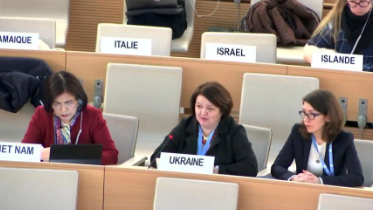 There is no law that provides for a comprehensive definition of discrimination against women. Domestic violence has tremendously increased despite laws against spousal violence. The current law did not explicitly address marital rape nor presume non-consent where the perpetrator exploits a power-relationship (such as incest, work superiors, doctors, teachers, etc.). Ukraine called on Japan to introduce a comprehensive definition of discrimination against women that encompassed direct and indirect discrimination. Canada emphasised that Japan should amend the Penal Code to ensure that it addressed violence against women through provisions penalising domestic violence, marital rape and incest. The UK expressed concern about the lack of representation of women in political and public life, particularly in senior positions. It called on Japan to provide information on the changes made to the content of the legislation on political parties and updated statistics on women’s participation in the legislative, executive and the judiciary.
There is no law that provides for a comprehensive definition of discrimination against women. Domestic violence has tremendously increased despite laws against spousal violence. The current law did not explicitly address marital rape nor presume non-consent where the perpetrator exploits a power-relationship (such as incest, work superiors, doctors, teachers, etc.). Ukraine called on Japan to introduce a comprehensive definition of discrimination against women that encompassed direct and indirect discrimination. Canada emphasised that Japan should amend the Penal Code to ensure that it addressed violence against women through provisions penalising domestic violence, marital rape and incest. The UK expressed concern about the lack of representation of women in political and public life, particularly in senior positions. It called on Japan to provide information on the changes made to the content of the legislation on political parties and updated statistics on women’s participation in the legislative, executive and the judiciary.
In response, Article 14 of the Constitution of Japan stipulates that all citizens are equal under the law and are not discriminated against on the basis of gender. The Basic Act for Gender Equal Society emphasises that “the formation of a gender-equal society shall be carried out not treating men and women in a way that discrimination against them based on gender” (Article 3). The Act on Securing, Etc. of Equal Opportunity and Treatment between Men and Women in Employment prohibits direct and indirect discrimination between men and women in the field of employment, including women, and foreign workers, and prohibits dismissal and other disadvantageous treatment of women workers on the grounds of pregnancy and childbirth, providing correctional guidance to employers in violation of the Act. In December 2020, the country formulated the Fifth Basic Plan to Gender Equality, a five-year plan, and is working to increase women’s participation in all fields.
Prohibition of all forms of slavery, including trafficking in persons
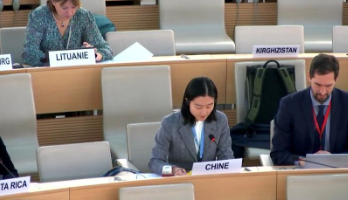 Japan minimised its responsibility on the issue of “comfort women” and ignored their potential negative impact on survivors. China urged Japan to ensure a lasting solution inclusive of comfort women of all nationalities, accepting responsibility for its role in the violation of the human rights of these women. It emphasised that Japan should provide information on measures taken to recognise the right of victims to truth, justice and a remedy, with full and effective redress and reparation.
Japan minimised its responsibility on the issue of “comfort women” and ignored their potential negative impact on survivors. China urged Japan to ensure a lasting solution inclusive of comfort women of all nationalities, accepting responsibility for its role in the violation of the human rights of these women. It emphasised that Japan should provide information on measures taken to recognise the right of victims to truth, justice and a remedy, with full and effective redress and reparation.
Although Japan has strict laws that punish sexual exploitation, it is loose in enforcing them. It is critical that Japan must work to stop the substantial sex industry by enacting comprehensive legislation to combat human trafficking, including the sexual exploitation of girls and women. Thailand called on Japan to make efforts to combat human trafficking and adopt specific legislation criminalising it, and ensure that it thoroughly investigated, prosecuted and punished perpetrators.
In response, Japan has made serious and continuous efforts to ensure proper domestic implementation of the United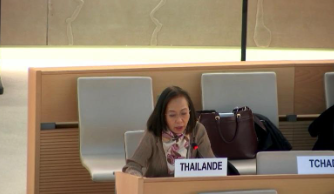
Nations Convention against Transnational Organized Crime and the Trafficking in Persons Protocol. The country has also criminalised all acts that fall under trafficking in persons, as defined in the TIP Protocol, by an amendment to the Penal Code in 2005. It also works with relevant foreign government agencies, international organisations, and NGOs to prevent and combat trafficking in persons, to properly identify and protect victims, to support the safe return to their home countries or third countries, as well as to raise awareness among relevant administrative officials and to raise public awareness. In addition, the Law Enforcement Task Force against Trafficking in Persons, consisting of relevant ministries and agencies, has prepared the Handbook on Measures against Trafficking in Persons, which summarises laws and regulations applicable to trafficking cases and specific examples of such applications.
Position of Geneva International Centre for Justice
Geneva International Centre for Justice (GICJ) urges Japan to reform all legislative measures for the protection and promotion of the rights of women in the country. Further, we urge the country to take the victim-centred approach to propose an inclusive solution for the “comfort women '' matter. To conclude, we urge Japan to invest into the health infrastructure system in order to ensure the full access of all persons, including foreign workers and trainees in the country.
Japan, Right to Health, Trafficking in Persons, Comfort Women, Women Rights, Geneva, geneva4justice, GICJ, Geneva International Centre For Justice




